【高中英语语法】情态动词和虚拟语气 情态动词
高中英语语法情态动词与虚拟语气讲解
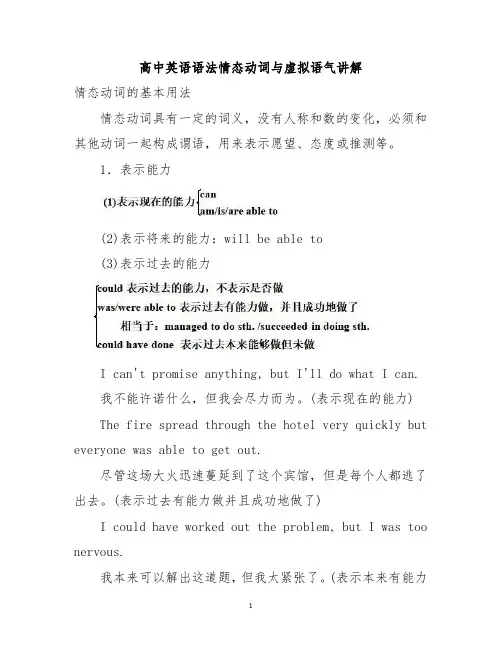
高中英语语法情态动词与虚拟语气讲解情态动词的基本用法情态动词具有一定的词义,没有人称和数的变化,必须和其他动词一起构成谓语,用来表示愿望、态度或推测等。
1.表示能力(2)表示将来的能力:will be able to(3)表示过去的能力I can't promise anything, but I'll do what I can.我不能许诺什么,但我会尽力而为。
(表示现在的能力)The fire spread through the hotel very quickly but everyone was able to get out.尽管这场大火迅速蔓延到了这个宾馆,但是每个人都逃了出去。
(表示过去有能力做并且成功地做了)I could have worked out the problem, but I was too nervous.我本来可以解出这道题,但我太紧张了。
(表示本来有能力做但未做)2.表示推测(可能性)可能性可分为客观的可能性和具体事情实际发生的可能性两种。
(1)客观的可能性并不表示具体某事是否会发生,而用来说明人或事物的特征。
情态动词can可用于肯定句中表示客观的(或理论的)可能性,而表示具体事情实际发生的可能性时, can 一般不用于肯定句。
Accidents can happen on such rainy days.在这样的多雨天气里可能会发生事故。
(表示客观的可能性)We may go to the cinema tonight, but we are not sure yet.今晚我们可能去看电影,但还没确定。
(表示实际可能性,不用can)(2)表示具体事情实际发生的可能性表示具体事情实际发生的可能性的层次(由强及弱)比较:①在肯定句中表示推测(must/have to, should/ought to, may, might, could)a.当说话者表达怀疑或犹豫之意时,需用may, might或could, 其中might, could比may所表达的怀疑或犹豫之意更强。
高三英语高考语法知识点归纳总结情态动词和虚拟语气 情态动词
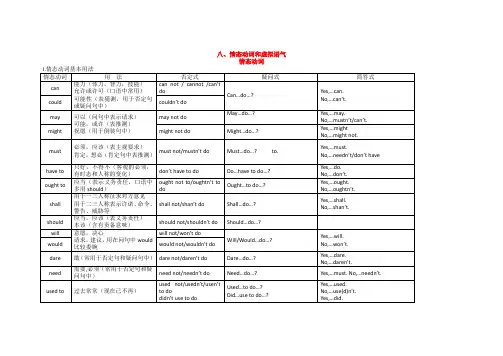
虚拟与陈述的混合:各遵守各的规则
①He could have passed the exam,but he wasn’t careful enough.
You should have come earlier.The bus left a moment ago.
应当(表示义务责任,口语中多用should)
ought not to/oughtn’t to do
Ought…to do…?
Yes,…ought.
No,…oughtn’t.
shall
用于一三人称征求对方意见
用于二三人称表示许诺、命令、警告、威胁等
shall not/shan’t do
Shall…do…?
A.mustB.mayC.can D.will
而can表示的是逻辑上的可能性:
Mary is in poor health. She can be ill at any times.
在否定句中只能用can和may。所以can’t时用以代替mustn’t,语气比may更肯定。中文可以翻译为不可能。
Michael______be a policeman, for he’s much too short.
II.情态动词的重点知识
表示“能力、许可”的can和may
表示能力的情态动词用can/could
A computer_____think for itself; it must be told what to do.
A.can’tB.mustn’t C.may not D.might not
表示许可时用may/might ,can/could都可以,但在问句中用could…?或might…?以使口气委婉客气,其回答一定要用can或may,以使回答口气明确(must表示一定,必须,mustn’t表示禁止,不许可)。
高考英语语法复习情态动词和虚拟语气

4
5. Should I open the window? 我可以开窗户吗? 6. You shouldn't be sitting in the sun. 你不应该坐在阳光下。
4
7. It's 4:30. They should be in New York by now. 现在是4点半,他们应该到达纽约了。 8. If he should drop in, give him my message. 他若来访,就将我的消息给他。
(2)He shall be punished if he disobeys. 你照我的样子办。
他若不服从就要受到处罚。
4
3. (1)You shall have my answer tomorrow. (2)She shall get her share. (1)你明天可以得到我的答复。
(2)她可以得到她的一份。 4. (1)Shall I get you some coffee, Miss Fleure?
除了 can , would 以外,英语中还有很多情态动 词 。 常 见 情 态 动 词 有 : must , can(could) , may(might) , ought to , need , dare shall(should) , will(would) have (had) to,used to, had better,would rather。 注意:need,dare也可用作实义动词。
6
4. May you succeed.
祝你成功。
5. (1)You may well say so.
高中英语语法系统讲解之八情态动词和虚拟语气
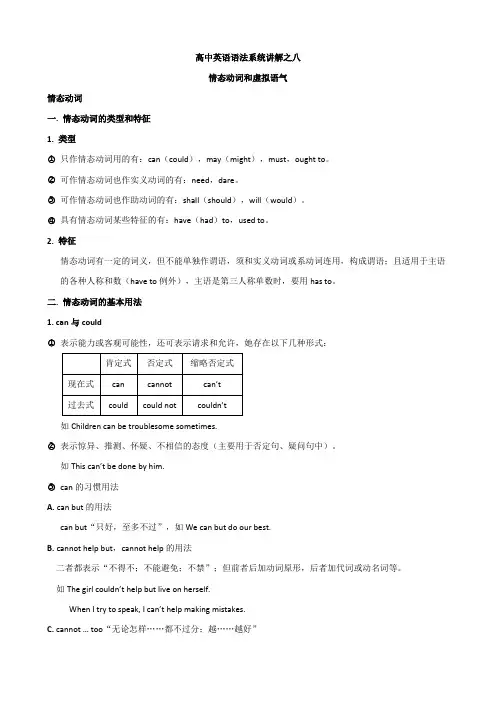
高中英语语法系统讲解之八情态动词和虚拟语气情态动词一. 情态动词的类型和特征1. 类型○1只作情态动词用的有:can(could),may(might),must,ought to。
○2可作情态动词也作实义动词的有:need,dare。
○3可作情态动词也作助动词的有:shall(should),will(would)。
○4具有情态动词某些特征的有:have(had)to,used to。
2. 特征情态动词有一定的词义,但不能单独作谓语,须和实义动词或系动词连用,构成谓语;且适用于主语的各种人称和数(have to例外),主语是第三人称单数时,要用has to。
二. 情态动词的基本用法1. can与could○1表示能力或客观可能性,还可表示请求和允许,她存在以下几种形式:如Children can be troublesome sometimes.○2表示惊异、推测、怀疑、不相信的态度(主要用于否定句、疑问句中)。
如This can’t be done by him.○3can的习惯用法A. can but的用法can but“只好,至多不过”,如We can but do our best.B. cannot help but,cannot help的用法二者都表示“不得不;不能避免;不禁”;但前者后加动词原形,后者加代词或动名词等。
如The girl couldn’t help but live on herself.When I try to speak, I can’t help making mistakes.C. cannot … too“无论怎样……都不过分;越……越好”如We can’t thank you too much for what you have done for us。
We can not be too careful to cross the road.温馨提示:○1can与be able to:can表示有能力做某事,be able to表示通过努力、克服困难做成某事。
高中英语考点汇总:情态动词和虚拟语气
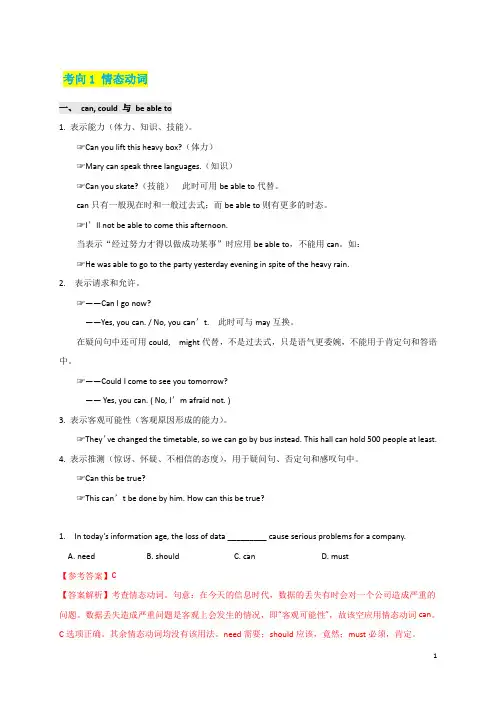
考向1 情态动词一、can, could 与be able to1. 表示能力(体力、知识、技能)。
☞Can you lift this heavy box?(体力)☞Mary can speak three languages.(知识)☞Can you skate?(技能)此时可用be able to代替。
can只有一般现在时和一般过去式;而be able to则有更多的时态。
☞I’ll not be able to come this afternoon.当表示“经过努力才得以做成功某事”时应用be able to,不能用can。
如:☞He was able to go to the party yesterday evening in spite of the heavy rain.2. 表示请求和允许。
☞——Can I go now?——Yes, you can. / No, you can’t. 此时可与may互换。
在疑问句中还可用could, might代替,不是过去式,只是语气更委婉,不能用于肯定句和答语中。
☞——Could I come to see you tomorrow?—— Yes, you can. ( No, I’m afraid not. )3. 表示客观可能性(客观原因形成的能力)。
☞They’ve changed the timetable, so we can go by bus instead. This hall can hold 500 people at least.4. 表示推测(惊讶、怀疑、不相信的态度),用于疑问句、否定句和感叹句中。
☞Can this be true?☞This can’t be done by him. How can this be true?1.In today’s information age, the loss of data _________ cause serious problems for a company.A. needB. shouldC. canD. must【参考答案】C【答案解析】考查情态动词。
高考英语语法考点解读:情态动词和虚拟语气
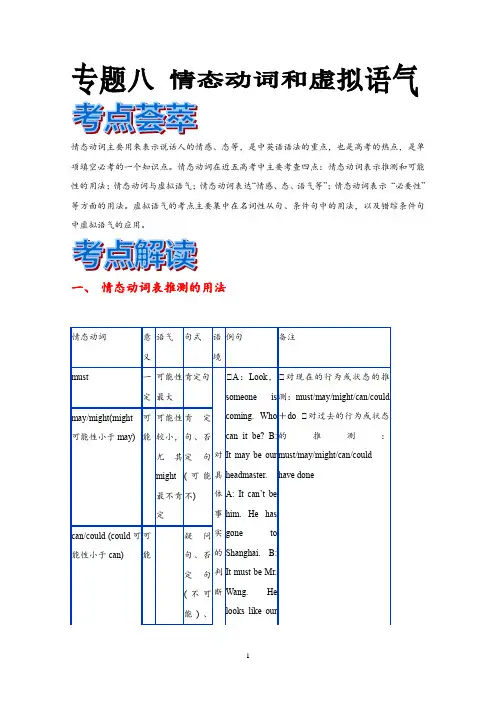
情态动词主要用来表示说话人的情感、态等,是中英语语法的重点,也是高考的热点,是单项填空必考的一个知识点。
情态动词在近五高考中主要考查四点:情态动词表示推测和可能性的用法;情态动词与虚拟语气;情态动词表达“情感、态、语气等”;情态动词表示“必要性”等方面的用法。
虚拟语气的考点主要集中在名词性从句、条件句中的用法,以及错综条件句中虚拟语气的应用。
一、情态动词表推测的用法headmaster.①That maynot be true.①He couldn'thavediscovered thetruth.注意:should (ought to)表示推测是高考考查的重点和难点。
如:—When can I come for the photos?I need them tomorrow afternoon.—They ________ be ready by 12:00.A.can B.should C.might D.need【解析】B A项表示推测时常用于否定句和疑问句中。
C项表示推测语气不太肯定。
should意为“按理说,理应”,既回答了顾客的询问,不失礼貌,又为照片有可能尚未洗好,顾客到时取不到留下了回旋的余地,体现了店主的精明与用词经过仔细推敲。
二、情态动词的其他用法1.can, could, may, might2.must, should3. need, dare4.shall/will/would4.shall/will/would4.shall/will/would二、情态动词+have done四、虚拟语气虚拟语气表示说话人所说的话不是事实,而是一种假设、愿望、怀疑或推测。
1.虚拟语气在条件句中的用法If it were to rain tomorrow, I should not drive my car. 如果明天下雨的话,我就不开车了。
(明天的情况还不知道)If I had done it in time, I should have had a good time. 如果我及时做的话,日子就好过多了。
高中英语语法总结:情态动词和虚拟语气
高中英语语法总结:情态动词和虚拟语气考向1 情态动词一、 can, could与be able to1. 表示能力(体力、知识、技能)。
☞Can you lift this heavy box?(体力)☞Mary can speak three languages.(知识)☞Can you skate?(技能)此时可用be able to代替。
can只有一般现在时和一般过去式;而be able to则有更多的时态。
☞I’ll not be able to come this afternoon.当表示"经过努力才得以做成功某事"时应用be able to,不能用can。
如:☞He was able to go to the party yesterday evening in spite of the heavy rain.2. 表示请求和允许。
☞—Can I go now?—Yes, you can. / No, you can’t. 此时可与may互换。
在疑问句中还可用could, might代替,不是过去式,只是语气更委婉,不能用于肯定句和答语中。
☞—Could I come to see you tomorrow?—Yes, you can. (No, I’m afraid not.)3. 表示客观可能性(客观原因形成的能力)。
☞They’ve changed the timetable, so we can go by bus instead. This hall can hold 500 people at least.4. 表示推测(惊讶、怀疑、不相信的态度),用于疑问句、否定句和感叹句中。
☞Can this be true?☞This can’t be done by him. How can this be true?二、 may, might1. 表示请求和允许。
might比 may语气更委婉,而不是过去式。
语法篇专题情态动词和虚拟语气
用法
例句
can和could
表示能力
He can speak English better than you.
表示请求 或允诺?
You can have the book when I have finished it. Could you come again tomorrow?
表示客观可能性
should have done
过去本来应该……,而实际上没有……
The plant is dead. Maybe I should have given it more water.
ought to have done
过去本该……,而未……
You ought to have given him more help.
专题八 情态动词和虚拟语气
情态动词
一、情态动词 定义:情态动词是一种本身具有一定词义,但要与动词原形及其被动语态一起使用的词。它给谓语动词增添情态色彩,表示说话人对有关行为或事物的态度和看法,认为其可能、应该或必要等。 二、情态动词的特点 情态动词无人称和数的变化, 情态动词后面跟的动词需用原形,否定式构成是在情态动词后面加“not”。 个别情态动词有现在式和过去式两种形式, 过去式用来表达更加客气, 委婉的语气, 时态性不强, 可用于过去,现在或将来。情态动词属于非及物动词,故没有被动语态。
三、情态动词的语法特征 (1) 情态动词不能表示正在发生或已经发生的事情,只表示期待或估计某事的发生。 (2) 情态动词除ought 和have 外,后面只能接不带to 的不定式。 (3) 情态动词没有人称和数的变化,即其第三人称单数不加s。 (4) 情态动词没有非限定形式,即没有不定式,分词形式,也没有相应的动名词。 四、情态动词的基本用法
情态动词和虚拟语气
情态动词和虚拟语气情态动词主要用来表示说话人的情感、态度等,是中学英语语法的重点,也是高考的热点,是单项填空必考的一个知识点。
情态动词在近五年高考中主要考查四点:情态动词表示推测和可能性的用法;情态动词与虚拟语气;情态动词表达“情感、态度、语气等”;情态动词表示“必要性”等方面的用法。
虚拟语气的考点主要集中在名词性从句、条件句中的用法,以及错综条件句中虚拟语气的应用。
一、概念1.什么是情态动词本身有一定词义,是表达说话人的情感、态度、语气的词,其作用是给动词增添感情色彩②表现形式:情态动词+动词原形/be2.特点①没有人称和数的变化②不能直接跟宾语,必须搭配实义动词或be动词的原形③情态动词的过去式往往不表时态,而表示更加委婉的语气。
例句:Can/could you help me?2.情态动词的表现形式1)情态动词+do例句:We must help each other to overcome the difficulties.You shouldn’t be so careless.2)情态动词+be doing例句:She must be sleeping now.My mother may/might be cooking now 3)情态动词+be done例句:Difficulties can and must be overcome. Something must be done to stop pollution.4)情态动词+have done例句:You ought to have come earlier.They might have finished the work.二、情态动词的分类1.只能作情态动词:must, can/could, may/might2.可作情态动词也可作助动词的:will/would, shall/should3.可作情态动词有可作实义动词的:need,dare4.具有情态动词特征的:ought to, have to, beable to三、分类讲解1.can /could1)表示能力:会,在表示过去的能力时用could 例句:I can swim.Lucy can dance well and her mother could dance well when she was young.The cinema can seat 500 people.I could not read such an easy book when I was 7 years old.2)表允许,许可常用在口语中,此时could 不表示过去式,而表示语气上比can更客气。
高中英语情态动词用法和虚拟语气语法知识
高中英语情态动词用法和虚拟语气语法知识一、can和could1、can的用法(1)表示体力和脑力方面的能力。
(2)表示对现在的动作或状态进行主观的猜测,主要用在否定句和疑问句中。
(3)表示可能性,理论上的可能性,意为“有时候可能会”,可用于肯定句。
(4)表示允许,意思与may接近。
(5)表示说话人的推测、怀疑、惊异、猜测或不肯定等,主要用于否定句、疑问句或感叹句中。
(6)can的特殊句型cannot…too / enough表示“无论怎么。
也不过分”。
“越……越好”。
cannot but+ do sth.表示“不得不,只好”。
2、could的用法(1)表示能力,指的是过去时间。
(2)表示允许,指的是过去时间。
(3)表示可能,可以指过去时间,也可以指现在时间,表示语气缓和。
(4)委婉客气地提出问题或陈述看法,指的是现在时间。
主要用于疑问句,回答时用can。
3、can与could的区别can表推测时只用于否定句和疑问句(could无此限制)。
couldn't的可能性比can't小。
4、can与be able to的区别(1)现在时:无区别,但后者不常用。
(2)完成时;can没有完成时,此时要用have(has,had)been able to。
(3)将来时:can没有将来时,要用will be able to。
(4)过去时:could表示一般能力,was/were able to 表示在具体场合通过努力成功做成某事的能力。
二、may 和might1、may的用法(1)表示询问或说明一件事可不可以做。
(2)表示一件事或许会发生或某种情况可能会存在,通常用在肯定句和否定句中。
注意:表示可能性时,can't语气强,表示“不可能”,may not语气弱,表示“可能不”。
2、might的用法(1)表示询问或允许,指的是过去时间。
(2)表示可能发生的事,可以指过去时间,也可以指现在时间,语气更加不肯定,可能性比may小一些。
- 1、下载文档前请自行甄别文档内容的完整性,平台不提供额外的编辑、内容补充、找答案等附加服务。
- 2、"仅部分预览"的文档,不可在线预览部分如存在完整性等问题,可反馈申请退款(可完整预览的文档不适用该条件!)。
- 3、如文档侵犯您的权益,请联系客服反馈,我们会尽快为您处理(人工客服工作时间:9:00-18:30)。
everyone_____get out.
A.had to B.would C.couldD.was able to
表示“推断、判断”的can
may,must
在肯定句中都可以用来表示可能。在含义上must语气最肯定,may表示的是事实上的可能性。
shall not/shan’t do
Shall…do…?
Yes,…shall.
No,…shan’t.
should
应当,应该(表义务责任)
本该(含有责备意味)
should not/shouldn’t do
Should…do…?
will
意愿,决心
请求,建议,用在问句中would比较委婉
will not/won’t do
If I had been free,I would have visited you.
与将来事实相反
从句动词:过去式/should+动词原形/were+to do
主句动词:should/would/cou ld/might+动词原形
If it should rain tomorrow, we would not go camping.
A.will B.couldC.mayD.might
②Johnny, you_____play with the knife, you_____hurt yourself.
A.won’t/can’tB.mustn’t/may
C.shouldn’t/must D.can’t/shouldn ’t
在肯定句中could不可以用来表示过去某一特定场合的能力,而要用was/were able to。
在否定句中只能用can和may。所以can’t时用以代替mustn’t,语气比may更肯定。中文可以翻译为不可能。
Michael______be a policeman, for he’s much too short.
A.needn’tB.can’tC.should D.may
在疑问句只能用can,不能用may和must。
He may be very busy now. Can he be very busy now?
He must be very busy now. Can he be very busy now?
need
need作为情态动词只有一种形式,只用于否定句和疑问句。
dare
dare作为情态动词用时有两种形式:dare和dared两个词形,除了可以用于否定句和疑问句外,还可以用于条件从句或表示怀疑的句子中。
must+ have done:对过去发生的行为肯定的推测。
其否定式为:cannot have done。
You must have seen the film.
You cannot have seen the film.
needn’t+ have done:本来不必要做的而实际上又做了。
You needn’t have watered the flowers,for it is going to rain.
混合虚拟条件句
不同时间的虚拟:各遵守各的规则
①If he had listened to me, he would not be in trouble now.
②If he had told me yesterday,I should know w hat to do now.
③If I were you, I would have gone to her birthday party.
No,…might not.
must
必须,应该(表主观要求)
肯定,想必(肯定句中表推测)
must not/mustn’t do
Must…do…? to.
Yes,…must.
No,…needn’t/don’t have
have to
只好,不得不(客观的必须,有时态和人称的变化)
don’t have to do
虚拟与陈述的混合:各遵守各的规则
①He could have passed the exam,but he wasn’t careful enough.
②You should have come earlier.The bus left a moment ago.
含蓄虚拟
条件句
but for+名词表示虚拟条件
注意:didn’t need to(have to)do:
没有必要做而实际上也没有做
I didn’t need to clean the wi_ndows.My sister did it 2 hours ago.
should(ought to)+ have done:本来应该做而实际上又没有做。其否定形式表示某中行为不该发生却发生了。
Do…have to do…?
Yes,…do.
No,…don’t.
ought to
应当(表示义务责任,口语中多用should)
ought not to/oughtn’t to do
Ought…to do…?
Yes,…ought.
No,…oughtn’t.
shall
用于一三人称征求对方意见
用于二三人称表示许诺、命令、警告、威胁等
句 子或主句中的谓语动词的形式视具体情况而定。这是考查考生应变能力的最佳试题。
---But for your timely warning,we ______ into great trouble.
---You know we’re friends.
Can he have got the book?
might(may)+ have done:对过去发生的行为不太肯定的推测。
He may not have finished the work.
If we had taken the other road, we might have arrived earlier .
He shall be punished.威胁
should
劝告、建议、命令、应该做、道义上的责任。
You should(ought to) go to class right away.
I should(ought to) help him because he is in trouble.
will/would
’t.
could
couldn’t do
may
可以(问句中表示请求)
可能,或许(表推测)
祝愿(用于倒装句中)
may not do
May…do…?
Yes,…may.
No,…mustn’t/can’t.
might
might not do
Might…do…?
Yes,…might
You could have done better, but you didn’t try your best.
cannot+ have done:表示对现在或过去行为的否定推测。
He cannot have been to tha t town.
can+主语+ have done:表示对过去行为的怀疑或不肯定(用在疑问句中)。
请求、建议,would比will委婉客气。
Would you pass me the book?
表示意志、愿望和决心。
I will never do that again.
They asked us if we would do that again
would可表示过去反复发生的动作或某种倾向。
During the vacation he would visit me every week
Peter______come with us tonight, but he isn’t very sure yet.
A.mustB.mayC.can D.will
而can表示的是逻辑上的可能性:
Mary is in poor health. She can be ill at any times.
表示许可时用may/might ,can/could都可以,但在问句中用could…?或might…? 以使口气委婉客气,其回答一定要用can或may,以使回答口气明确(must表示一定,必须,mustn’t表示禁止,不许可)。
①—Could I call you by your first name? —Yes, you______
The wound would not heal.(伤口老是不能愈合)
would表示估计或猜想。
It would be about ten when he left home.
What would she be doing there?
情态动词+have done的用法
could+have done:本可以做而实际上未能做。
情态动词和虚拟语气情态动词
发布人:邱玲珊
分类:语法专题发布时间:2020-09-15 10:34:22阅读(3)评论(0)
情态动词和虚拟语气 情态动词
I.情态动词基本用法
情态动词
用 法
否定式
疑问式
简答式
can
能力(体力,智力,技能)
允许或许可(口语中常用)
可能性(表猜测,用于否定句或疑问句中)
can not / cannot /can’t do
shall
用于第一人称:征求对方的意见。
